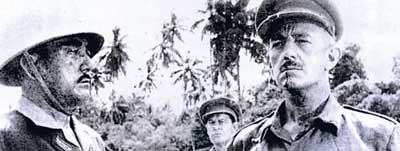
That great classic of yesteryearThe 80th Hollywood Oscar Awards is scheduled for today. Looking back half a century, the 1958 ceremony was of great significance to Sri Lanka. The movie "The Bridge on the River Kwai" won seven Oscars: Best Picture, Director, Actor and the awards for cinematography, editing, score and screenplay. Directed by the master movie maker Sir David Lean, it starred the brilliant Sir Alec Guinness, Wiliam Holden, Jack Hawkins and Sessue Hayakawa.
The picture was shot in Sri Lanka in 1956 mainly in Kitulgala and Ambepussa. Many Burgher boys were taken in as extras to play the British POWs. One in particular attained a sort of immortality by whistling the "Colonel Boogie March”, when asked by a production executive to hum collectively to lighten up the laborious march. This was retained in the completed picture as a part of the award winning score. The writer was in his late teens then and was at some location sites watching some of his colleagues in action and marvelled at the magic of movie making. The most interesting was the Studio publicity boys and their advance handouts with flamboyant prose screaming away exotic yarns. One example: "Peasants fled in terror today (8/11/56) as para-troopers descended on a village. They set the temple bells ringing to signal the start of an invasion. Police were called to explain.” Another: "When shooting commenced at Ambepussa (Village of the Mangoes) the local headmaster declared a half-holiday and the ring-side seats were taken by mothers, nursing babies at their breasts, old timers, many of them centenarians, farmers and herdsmen. And even the village constable…” But the imaginative publicity hacks failed to christen Kitulgala, "Stone of Nectar," or some such name! Whatever the blurbs and pulp fiction of the Hollywood rhapsodists, "The Bridge On the River Kwai" remains one of the greatest war epics ever made along with such classics as "All Quiet on the Western Front" and "Paths of Glory". |
|
||||||
|| Front
Page | News | Editorial | Columns | Sports | Plus | Financial
Times | International | Mirror | TV
Times | Funday
Times || |
| |
Reproduction of articles permitted when used without any alterations to contents and a link to the source page.
|
© Copyright
2008 | Wijeya
Newspapers Ltd.Colombo. Sri Lanka. All Rights Reserved. |
